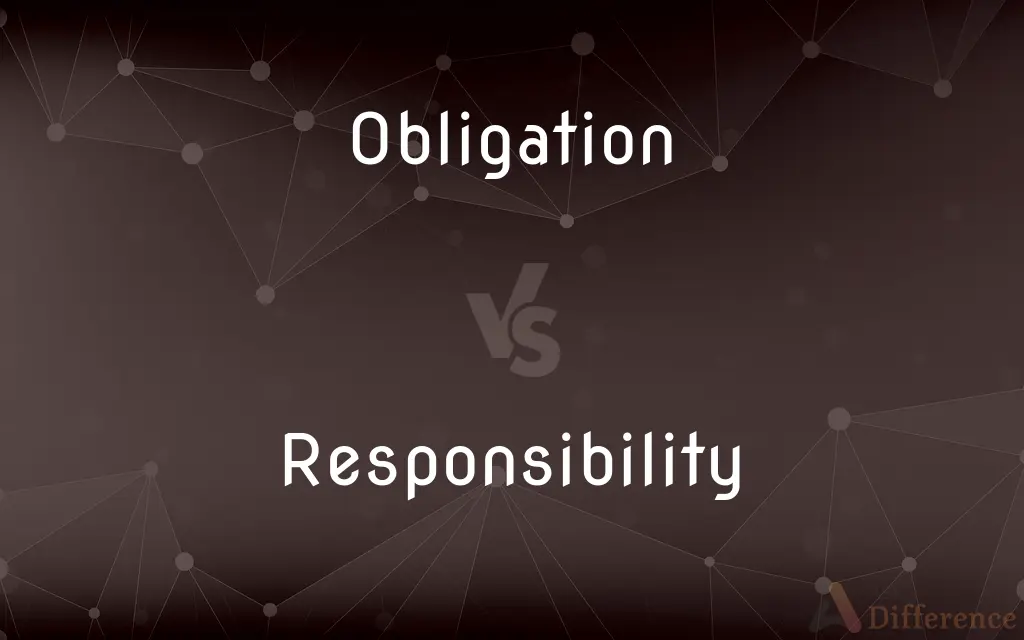Obligation vs. Responsibility — What's the Difference?
Edited by Tayyaba Rehman — By Fiza Rafique — Updated on September 22, 2023
Obligation refers to a duty or requirement imposed by law, contract, or moral principle, often with legal or social consequences for failure. Responsibility is a broader term that encompasses moral, ethical, or practical accountability for one's actions.

Difference Between Obligation and Responsibility
Table of Contents
ADVERTISEMENT
Key Differences
Obligation and responsibility are terms that are often used interchangeably but have subtle differences. Obligation is generally a requirement or duty that one is bound to fulfill, often due to external forces like contracts, laws, or societal expectations. Responsibility, on the other hand, leans more towards an ethical or moral duty that one voluntarily assumes.
Obligations are often explicit, defined by specific terms, and may have legal repercussions if not fulfilled. For instance, if you sign a lease for an apartment, you have a legal obligation to pay rent on time. Responsibilities, however, are often implicit and are generally more flexible. They are duties you assume, such as responsibly managing your finances, but without legal ramifications for failure.
Obligation usually comes from an external source and is not always voluntarily assumed. You might have an obligation to attend a meeting because your job requires it, even if you'd rather not go. Responsibility often comes from an internal sense of moral or ethical duty. For example, you may feel a responsibility to vote in an election because you believe it's your civic duty.
Another distinction between obligation and responsibility is the scope. Obligations are often more narrow and specific, tied to particular actions or requirements. Responsibilities tend to be broader, encompassing a wider range of behaviors and actions. For example, parents may have the obligation to provide food and shelter for their children but have the broader responsibility to also provide emotional and educational support.
Comparison Chart
Origin
Often external
Usually internal
ADVERTISEMENT
Legal Repercussions
Possible
Rarely
Specificity
Narrow, explicit
Broad, implicit
Voluntariness
Not always
Usually
Nature
Duty or requirement
Ethical or moral duty
Compare with Definitions
Obligation
Obligation often has specific, explicit terms.
The obligation to repay a loan comes with set terms and deadlines.
Responsibility
Responsibility does not usually carry legal ramifications.
Failing to recycle is a lapse in responsibility, but often not legally punishable.
Obligation
Obligation may carry legal consequences if not met.
Failing to fulfill your tax obligations can result in fines.
Responsibility
Responsibility is the state of being accountable for one's actions.
Driving safely is everyone's responsibility.
Obligation
Obligation is a duty imposed by law or contract.
Renters have an obligation to pay rent on time.
Responsibility
Responsibility is often assumed voluntarily.
She took on the responsibility of planning the community event.
Obligation
Obligation can be a moral or ethical requirement.
You have an obligation to tell the truth.
Responsibility
The state, quality, or fact of being responsible.
Obligation
Obligation is usually not voluntarily assumed.
Jury duty is an obligation that citizens are randomly selected for.
Responsibility
A duty or obligation that one is responsible for.
Obligation
An obligation is a course of action that someone is required to take, whether legal or moral. Obligations are constraints; they limit freedom.
Responsibility
An expense, debt, or financial burden that one must pay.
Obligation
A social, legal, or moral requirement, such as a duty, contract, or promise, that compels one to follow or avoid a particular course of action
Are you able to meet your obligations? I have an obligation to attend their wedding.
Responsibility
The amount of such expense, debt, or financial burden.
Obligation
The constraining power of a promise, contract, law, or sense of duty
I felt no obligation to offer my advice.
Responsibility
The state of being responsible, accountable, or answerable. 18
Responsibility is a heavy burden.
Obligation
(Law) A document in which a person binds himself or herself to undertake or refrain from doing a particular act.
Responsibility
The state of being liable, culpable, or responsible for something in particular.
Obligation
A debt instrument, such as a loan, mortgage, or bond.
Responsibility
A duty, obligation or liability for which someone is held accountable.
Why didn't you clean the house? That was your responsibility!
Obligation
The state, fact, or feeling of being indebted to another for a special service or favor received
If they invite us, aren't we under obligation to invite them in return?.
Responsibility
(military) The obligation to carry forward an assigned task to a successful conclusion. With responsibility goes authority to direct and take the necessary action to ensure success.
Obligation
The act of binding oneself by a social, legal, or moral tie to someone.
Responsibility
(military) The obligation for the proper custody, care, and safekeeping of property or funds entrusted to the possession or supervision of an individual.
Obligation
A social, legal, or moral requirement, duty, contract, or promise that compels someone to follow or avoid a particular course of action.
I feel I'm under obligation to attend my sister's wedding, even though we have a very frosty relationship.
Responsibility
The state of being responsible, accountable, or answerable, as for a trust, debt, or obligation.
Obligation
A course of action imposed by society, law, or conscience by which someone is bound or restricted.
Responsibility
That for which anyone is responsible or accountable; as, the resonsibilities of power.
Obligation
(legal) A legal agreement stipulating a specified action or forbearance by a party to the agreement; the document containing such agreement.
Responsibility
Ability to answer in payment; means of paying.
Obligation
The fact of being obliged to, that is, grateful for, something.
Responsibility
The social force that binds you to your obligations and the courses of action demanded by that force;
We must instill a sense of duty in our children
Every right implies a responsibility; every opportunity, an obligation; every possession, a duty
Obligation
The act of obligating.
Responsibility
The proper sphere or extent of your activities;
It was his province to take care of himself
Obligation
That which obligates or constrains; the binding power of a promise, contract, oath, or vow, or of law; that which constitutes legal or moral duty.
A tender conscience is a stronger obligation than a proson.
Responsibility
A form of trustworthiness; the trait of being answerable to someone for something or being responsible for one's conduct;
He holds a position of great responsibility
Obligation
Any act by which a person becomes bound to do something to or for another, or to forbear something; external duties imposed by law, promise, or contract, by the relations of society, or by courtesy, kindness, etc.
Every man has obligations which belong to his station. Duties extend beyond obligation, and direct the affections, desires, and intentions, as well as the actions.
Responsibility
Responsibility often implies ethical or moral duty.
You have the responsibility to treat everyone with respect.
Obligation
The state of being obligated or bound; the state of being indebted for an act of favor or kindness; - often used with under to indicate being in that state; as, to place others under obligations to one.
Responsibility
Responsibility is usually broader in scope.
Parents have the responsibility to care for their children in multiple ways.
Obligation
A bond with a condition annexed, and a penalty for nonfulfillment. In a larger sense, it is an acknowledgment of a duty to pay a certain sum or do a certain things.
Obligation
The social force that binds you to your obligations and the courses of action demanded by that force;
We must instill a sense of duty in our children
Every right implies a responsibility; every opportunity, an obligation; every possession, a duty
Obligation
The state of being obligated to do or pay something;
He is under an obligation to finish the job
Obligation
A personal relation in which one is indebted for a service or favor
Obligation
A legal agreement specifying a payment or action and the penalty for failure to comply
Common Curiosities
Can obligations have legal repercussions?
Yes, obligations often carry legal consequences if not met.
What is an obligation?
An obligation is a duty or requirement imposed by law, contract, or moral principle.
What is a responsibility?
Responsibility is the state of being accountable for one's actions, often voluntarily assumed.
Do responsibilities usually have legal repercussions?
Generally, responsibilities do not carry legal repercussions unless they overlap with legal obligations.
How do cultural norms affect obligations and responsibilities?
Cultural norms can define what is considered an obligation or responsibility within a particular community.
Are obligations always imposed externally?
Often, but not always. Obligations can also be moral or ethical in nature.
Can you give an example of an obligation?
Paying rent when you've signed a lease is a legal obligation.
Is it possible to have an obligation without responsibility?
Technically, yes. One can have a legal obligation without feeling a moral responsibility for it.
Can you be responsible for something but not obligated?
Yes, one can assume responsibility for tasks or actions without being legally or morally obligated to do so.
Are responsibilities generally voluntary?
Yes, responsibilities are often voluntarily assumed and are tied to moral or ethical duty.
Are responsibilities generally broad or specific?
Responsibilities are generally broader, often encompassing a range of actions or behaviors.
Can you give an example of a responsibility?
Taking care of a pet is a responsibility that people usually assume voluntarily.
What’s the relationship between obligation and responsibility?
While they are related, obligations are usually specific duties imposed externally, whereas responsibilities are broader and often voluntarily assumed.
Can obligations be ethical or moral?
Yes, obligations can extend beyond legal duties to include ethical or moral requirements.
Can responsibilities evolve over time?
Yes, what one considers a responsibility can change due to life circumstances, societal shifts, or personal growth.
Share Your Discovery

Previous Comparison
Silo vs. Granary
Next Comparison
Carton vs. CartoonAuthor Spotlight
Written by
Fiza RafiqueFiza Rafique is a skilled content writer at AskDifference.com, where she meticulously refines and enhances written pieces. Drawing from her vast editorial expertise, Fiza ensures clarity, accuracy, and precision in every article. Passionate about language, she continually seeks to elevate the quality of content for readers worldwide.
Edited by
Tayyaba RehmanTayyaba Rehman is a distinguished writer, currently serving as a primary contributor to askdifference.com. As a researcher in semantics and etymology, Tayyaba's passion for the complexity of languages and their distinctions has found a perfect home on the platform. Tayyaba delves into the intricacies of language, distinguishing between commonly confused words and phrases, thereby providing clarity for readers worldwide.
















































